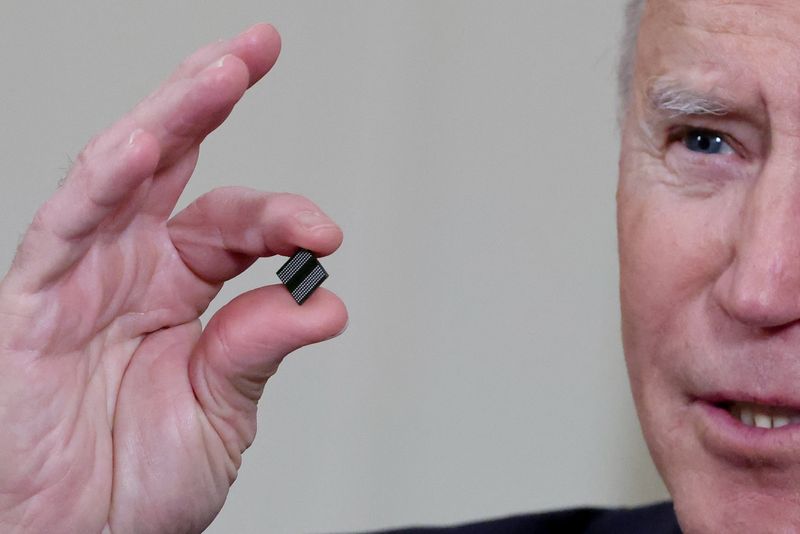By David Shepardson and Patricia Zengerle
WASHINGTON (Reuters) -U.S. House of Representatives leaders on Tuesday unveiled a bill aimed at increasing U.S. competitiveness with China and supporting the U.S. chip industry, including $52 billion to subsidize semiconductor manufacturing and research.
President Joe Biden’s administration is pushing to persuade Congress to approve funding to help boost chip production in the United States, as shortages of the key components used in autos and computers have exacerbated supply chain bottlenecks.
House Speaker Nancy Pelosi said the 2,900-page bill, called the “America Competes” act, would “supercharge” investment in chips and boost U.S. manufacturing and research capacity, as well as advancing U.S. competitiveness and leadership.
The Senate passed the U.S. Innovation and Competition Act last year, which includes $52 billion to increase U.S. semiconductor production and authorizes $190 billion to strengthen U.S. technology and research to compete with China.
The House bill has key differences with the Senate version. It does not contain the $190 billion for technology and research, but does include $45 billion to support supply chain resilience and manufacturing of critical goods, industrial equipment and manufacturing technology.
Funding could be used to “relocate a manufacturing facility out of countries of concern, including countries that pose a significant economic or national security threat to the United States,” the House said.
The government could use funds to establish stockpiles to provide “reserves necessary to maintain the availability of critical goods during supply chain shocks.”
The House is expected to take up its version next week. If it passes leaders of both chambers will negotiate to resolve differences.
“We’re in an all-out race for the jobs of the future and to protect our country’s global technological edge,” Senate Democratic Leader Chuck Schumer said.
President Joe Biden said the House and Senate proposals represented the “transformational investments in our industrial base and research and development” that helped power U.S. global economic leadership in the 20th century.
The House bill also includes a number of trade provisions and would impose additional sanctions on China for its treatment of Uyghurs and offer refugee status for qualifying Hong Kongers. The Chinese Embassy in Washington did not immediately comment.
The bill also reauthorizes and revises Trade Adjustment Assistance programs, which help workers whose jobs or pay is hurt by imports, and reforms the Generalized System of Preferences, a preferential tariff system for imports.
In addition, it would create a government review led by the U.S. Trade Representative to potentially block certain outbound investments made by U.S. companies in China and some other countries.
Opposition from business groups led the Senate to scratch similar language last year. The absence of such a measure, intended as one safeguard to help prevent U.S. taxpayer funds supporting semiconductor and other critical technology industries from being rerouted to overseas competitors, was seen by some lawmakers as a serious flaw in the Senate bill.
The House bill would review “offshoring of critical capacities and supply chains to foreign adversaries and non-market economies, like China and Russia.”
It would also authorize $3 billion to fund “a domestic solar manufacturing supply chain”, supporting the construction of new solar manufacturing capacity.
The bill would also give the Commerce Department the ability to impose tariffs if a government provides subsidies to a company operating in a different country, aimed at addressing China’s “Belt and Road Initiative.”
(Reporting by Patricia Zengerle, David Shepardson and Michael Martina; editing by Richard Pullin)
























